Samsung SSD 850 EVO (120GB, 250GB, 500GB & 1TB) Review
by Kristian Vättö on December 8, 2014 10:00 AM ESTRandom Read/Write Speed
The four corners of SSD performance are as follows: random read, random write, sequential read and sequential write speed. Random accesses are generally small in size, while sequential accesses tend to be larger and thus we have the four Iometer tests we use in all of our reviews.
Our first test writes 4KB in a completely random pattern over an 8GB space of the drive to simulate the sort of random access that you'd see on an OS drive (even this is more stressful than a normal desktop user would see). We perform three concurrent IOs and run the test for 3 minutes. The results reported are in average MB/s over the entire time.
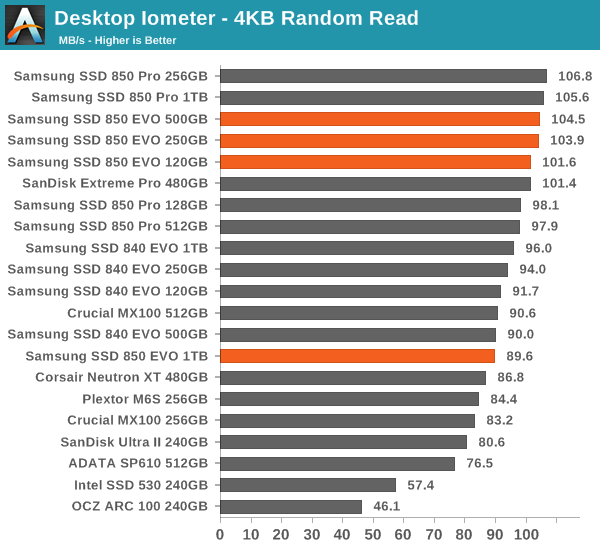
The models with the new MGX controller enjoy excellent random read performance, although the 1TB version isn't bad either. Without knowing the specifications of the MGX controller, it's hard to know what is causing the performance increase, but I still suspect it is due to a higher clock speed.
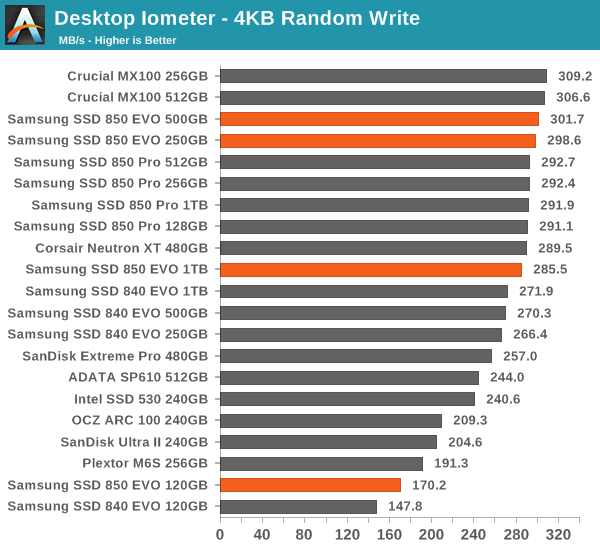
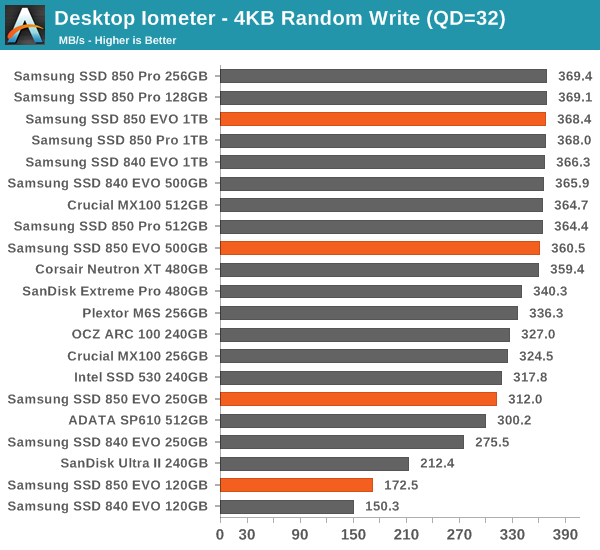
Random write performance also sees an increase across all capacities and is more or less on par with the 850 Pro at larger capacities.
Sequential Read/Write Speed
To measure sequential performance we run a 1 minute long 128KB sequential test over the entire span of the drive at a queue depth of 1. The results reported are in average MB/s over the entire test length.
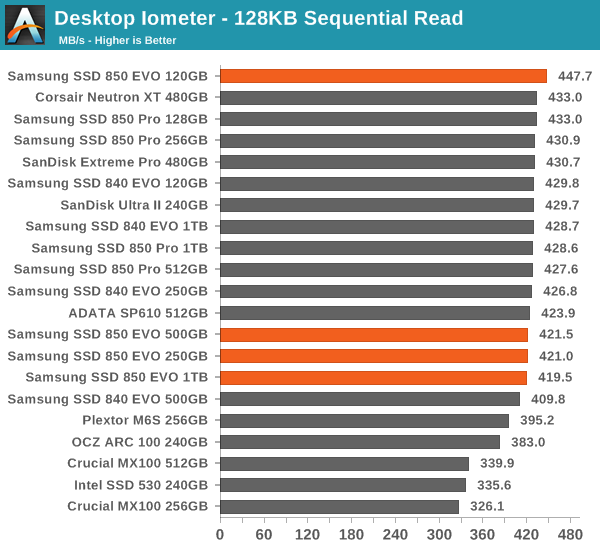
Sequential performance doesn't present any real surprises. Write speed at smaller capacities gets a small boost, but other than that the performance is typical SATA 6Gbps level.
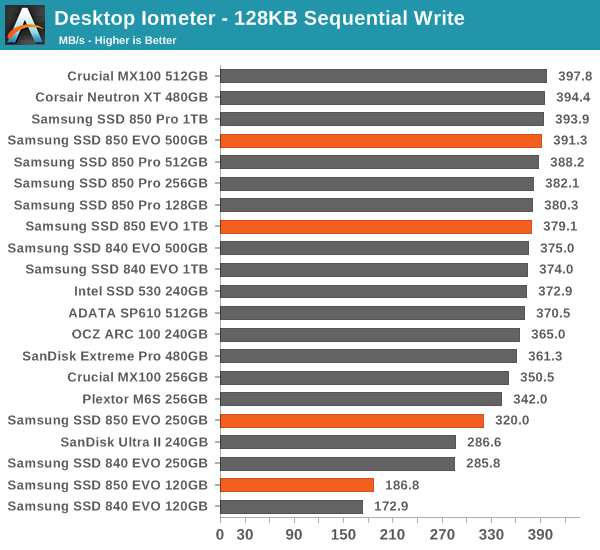
AS-SSD Incompressible Sequential Read/Write Performance
The AS-SSD sequential benchmark uses incompressible data for all of its transfers. The result is a pretty big reduction in sequential write speed on SandForce based controllers, but most other controllers are unaffected.
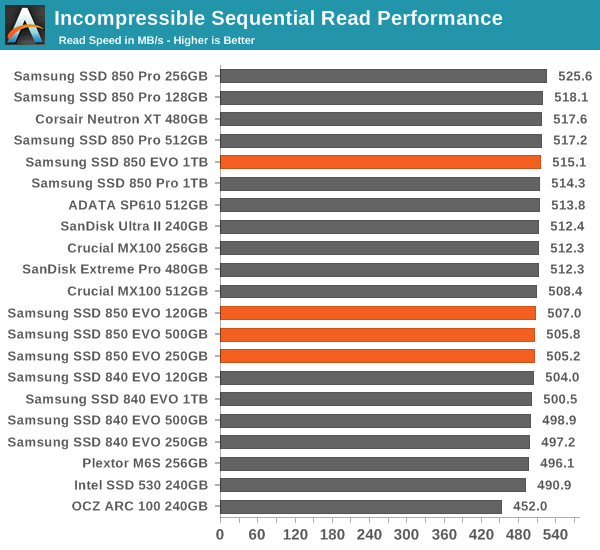
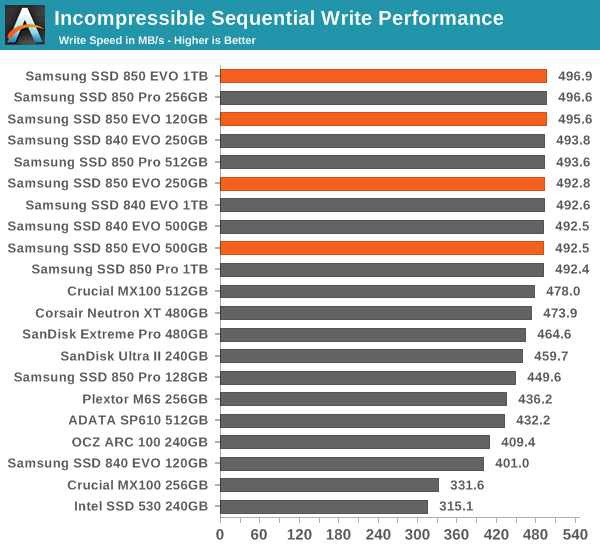










97 Comments
View All Comments
KAlmquist - Monday, December 8, 2014 - link
My guess is that Samsung doesn't have the ability to produce very much V-NAND. So the 850 PRO, and now the 850 EVO, are priced to encourage most people to choose SSD's from the 840 line rather than the 850 line, preventing demand for the 850 line from exceeding the supply.rms141 - Monday, December 8, 2014 - link
The absence of the Samsung 840 Pro from the Storage Bench 2013 section is pretty odd. Why wouldn't you include the previous generation's higher performing product? This is a little bit like publishing a GTX 970 review without including the GTX 780 for reference.Kristian Vättö - Tuesday, December 9, 2014 - link
You can always use the Bench tool to compare any and all drives that we have tested over the years:http://www.anandtech.com/bench/SSD/65
fokka - Monday, December 8, 2014 - link
it doesn't make much sense to complain about the msrp when the drive is just now trickling to retailers. you're probably not gonna make a good deal on a 850 evo before christmas, but the prices will come down considerably in q1/q2 2015, they always do.that said, i wouldn't mind paying a couple bucks more for a 850, compared to a 840, since it's just the all around better drive and it's lower power consumption alone makes it the better option for laptops.
pitted against an mx100 it might be a tougher sell, but let's just wait a bit for the prices to come down and give the early adopters some time to beta-test the firmware for us in the meantime.
Morawka - Tuesday, December 9, 2014 - link
Does TurboWrite, native encryption, and TRIM work in RAID 0 on the 850 EVO? Thats the only way i would invest $500+ into a SSD still bottlenecked by Sata 6hojnikb - Tuesday, December 9, 2014 - link
All of that should work with appropriate motherboard/storage drives, because drive itself is not aware whenever is in RAID or not.hojnikb - Tuesday, December 9, 2014 - link
*driverspaesan - Tuesday, December 9, 2014 - link
I just got a 1TB 840 evo for $369. No way the 850 evo is worth the extra $100.R3MF - Tuesday, December 9, 2014 - link
How do you conduct this review of a perfomance oriented SSD without discussing:1. m.2 format (or lack thereof)?
2. PCIe 3.0 4x m.2 performance (vs SATA 6G)?
3. NVME m.2 performance (vs SATA 6G)?
It is the end of 2014, who seriously spends £320 on a 1TB performance SSD without considering the high-speed m.2 drives just around the corner, to which a growing number of enthusiasts have empty slots on their shiny new motherboards?
hojnikb - Tuesday, December 9, 2014 - link
>How do you conduct this review of a perfomance oriented SSD without discussing:EVO is not a performance oriented drive. 850PRO is. And this was already discussed in other reviews/seperate articles.